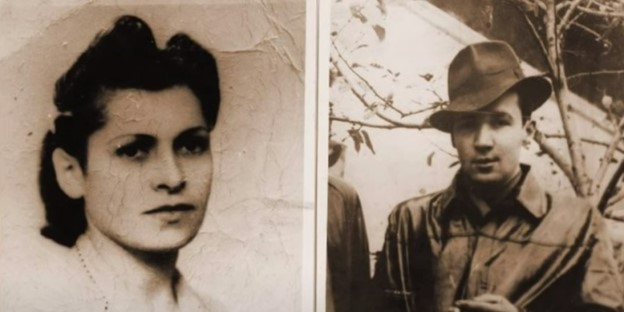The year was 1940. The Nazis had already begun threatening Europe, and the rest of the continent prepared for the looming war. A young 18-year-old Polish man named Jerzy Bielecki decided he would join his nation’s army in the fight. Little did Jerzy know the extraordinary life that would unfold, leaving him as one of the few prisoners to escape Auschwitz, and one that would cement his place as a Hero of the Holocaust.
A Christian and a Jew in Auschwitz
Preparing to cross the border into Hungary to join up with a Polish Army unit there, Jerzy was nabbed by the Nazis and sent to the Auschwitz-Birkenau concentration camp. Auschwitz having only recently opened in 1940, Jerzy received the tattooed prisoner number 243, among the first prisoners to be sent there.
Three years into his sentence, Jerzy found himself working at a grain warehouse at the camp. There, repairing burlap sacks, was a female Jewish prisoner, Cyla Cybulska, only a couple of years older than himself, and there all by herself, as her parents and siblings had all already been murdered in the gas chambers of Auschwitz.
A Great Escape
Despite the fact that the Nazis prohibited male and female prisoners from interacting, the two began to steal a word or two of conversation each day during their labour, and soon fell in love. And over the next months, Jerzy devised a plan for the two to escape - something very few prisoners ever did at Auschwitz.
Jerzy collected the supplies they would need, included a stolen SS uniform and a pass to leave the camp. On the morning of July 21, 1944, Jerzy appeared at the door of Cyla’s barracks, dressed in the Nazi outfit. He barked out the prison number tattooed on her arm, then together the two marched right out of the camp!
For weeks, Jerzy and Cyla walked east, traveling by night to keep from being discovered. Cyla, weakened by her time as a starving prisoner at Auschwitz, would run out of strength to go any farther, begging Jerzy to leave her. But Jerzy never did, either urging Cyla onward or even carrying her on his shoulders. Near starvation, the two at last reached a village where Jerzy’s uncle lived.
The two hid there at first, before Jerzy left to join the partisan resistance against the Nazis. Cyla moved to the house of the Czernik family, poor Christian peasants in a nearby village. The Czernicks sheltered Cyla for the rest of the war, treating her as family. Before parting, Jerzy and Cyla vowed to reunite once the war was over.
However, when the war ended, Cyla was told Jerzy had been killed during Operation Tempest, the series of uprisings by the Polish against the occupying Nazis. Jerzy, having survived the war, was informed that Cyla had left Poland and had died in Sweden. The two, thinking their true loves were gone, went on with their lives Cyla marrying a Jewish man and immigrating to the U.S., Jerzy working at a school for auto mechanics.
A Friendship Rekindled
In 1983, Cyla lived as a widow in New York, when she learned from a Polish cleaning woman of a documentary telling Jerzy’s amazing story of escape. She found his phone number and nearly 40 years after the two had escaped Auschwitz, Cyla Cybulska and Jerzy Bielecki spoke. She visited him in Poland many times, and together they visited Auschwitz, as well as the farm family who helped hide that scared Jewish girl.
Yad Vashem named Jerzy Bielecki a Righteous Among the Nations in 1985, and Israel declared him an honourary citizen. He passed away in 2011 at the age of 90, after founding the Christian Association of the Auschwitz Families. And the Jewish girl whose life this Hero of the Holocaust saved so many decades before, passed on to her eternal reward as an elderly woman, as well, in 2005, a life that the Holocaust could not cut short.



